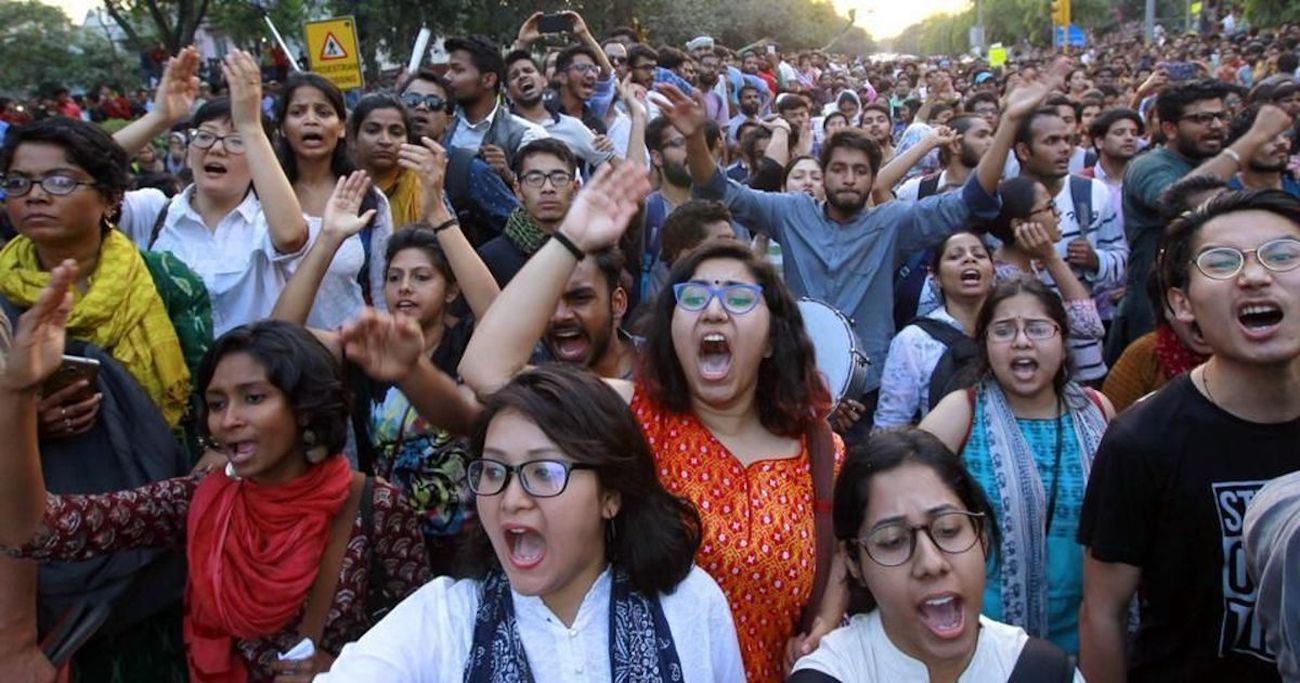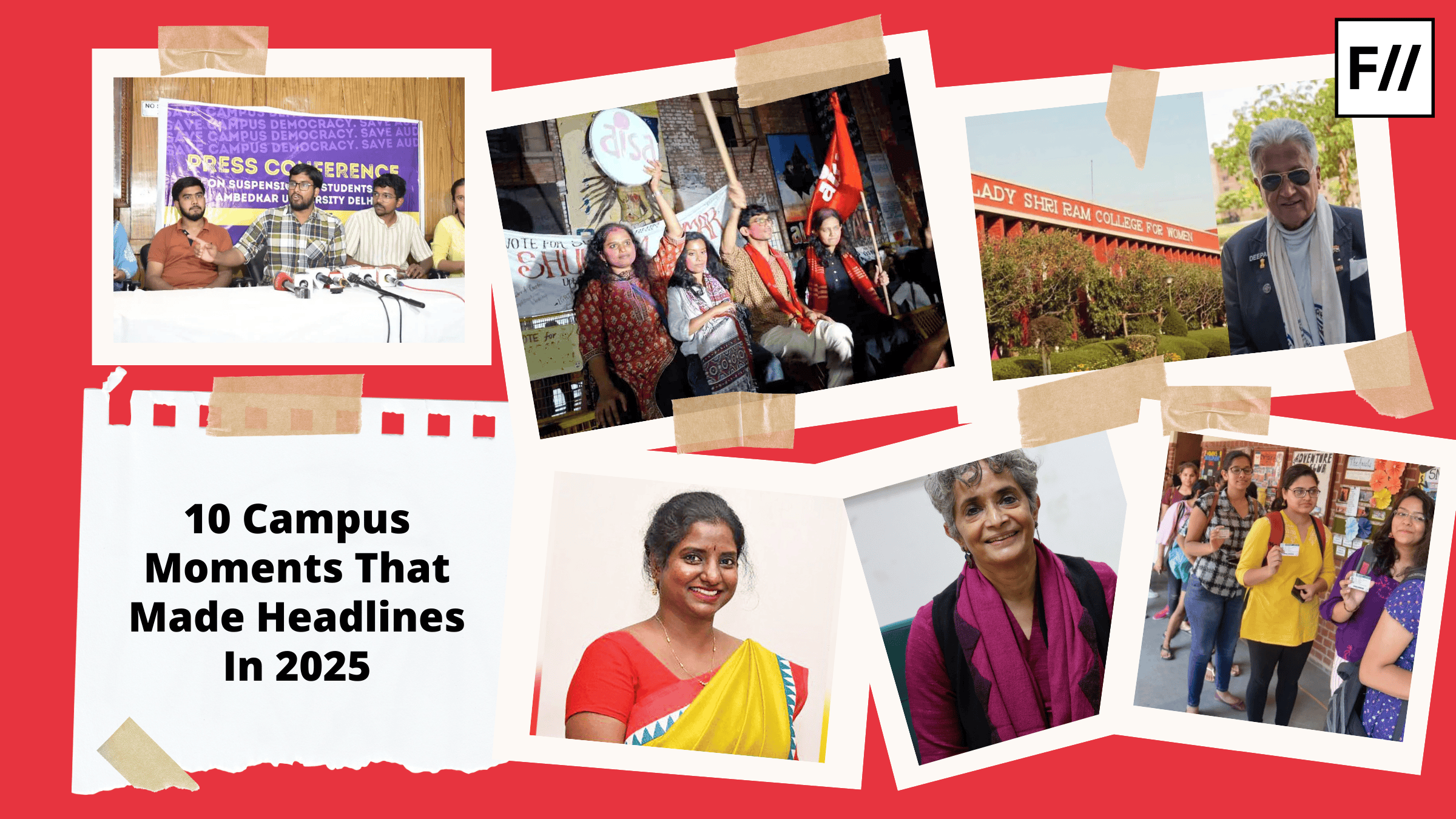It seems like female education and solidarity politics is an unacceptable and unholy alliance for many in this country, especially some of the taxpayers. Each time the Jawaharlal Nehru University (JNU) is in the headlines for its protests, female students and scholars from this institution are always put through some of the most demeaning, ridiculing and at the same time, hilarious judgments. What first used to be the favourite sport of the misogynistic trolls has now also become prime time reportage for few national media channels.
In the wake of the ongoing student resistance against the massive fee hike, JNU’s campus culture, academic life style and student politics has faced unmatchable scrutiny from people who might have never visited this place in person. Fake pictures of women consuming alcohol, smoking cigarettes and using condom as a hair tie are doing rounds on social media, leaving a narrative behind that women in this university happen to be of questionable character and maintain an “immoral” lifestyle. Twitter and other social media are no short of similar posts and unverified clippings which are, by the way, unregulatedly going viral. A narrative, alongside the one about taxpayers money being wasted on alleged “antinationals”, is also being set against the women scholars and students as to why should the hard earned taxpayers money be spent on those women who have sex.
The fact that women could even have political opinions, consciousness and awareness of the social reality of systematic oppression shakes the very imagination of the extreme right.
JNU, where more than half of the registered student population is constituted by women, maintained a unique model of “deprivation points” which used to facilitate entry of poorest of poor students, and women candidates, until now. The campus has always been a liberated space of free expression and movement for its women students. Hard to believe in a city like Delhi, but the campus life and its student activism has always ensured a public culture of absolute intolerance towards ragging, eve teasing or violence. So, why is it that women of JNU, inspite of being national level achievers, researchers and academicians subjected to venomous scrutiny and bigotry? What explains the slut shaming, age-shaming and body shaming of research scholars belonging to the premier most institution of this country? Does the nation needs to know, maybe more?
Loud, Political Women – Is that the problem?
JNU student life and activism are inseparable. Even if not affiliated to any specific political organisation, almost every student articulates her/his position on various social, cultural and political issues. With a strong presence of gender sensitisation as a result of various student and union level awareness programs, outreach activities and feminist discourses in the form of public meetings, lectures and other academic and extracurricular activities, women have always held patriarchy by its collar.
The fact that women could even have political opinions, consciousness and awareness of the social reality of systematic oppression shakes the very imagination of the extreme right, whose very premise is built on a hyper-masculine conceptualisation of society and politics. A politically articulate woman means a female who is aware of her rights and hence, one who is capable of challenging cultural hegemony. This is usually seen as a threat to the masculine socio-cultural order where a woman is a contributor through not just material but also emotional labour.
Also read: How The Public Perception Of ‘JNU Women’ Is Sculpted And Consumed
Unacceptable Angry Women
Eccentricity, anger and rebel are not the qualities that usually go with the feminine woman, as conceptualised by the dominant Indian imagination. A woman’s self is best described as coy, cultured, soft spoken and obedient in India. However, to these taxpayers’ disappointment, women of JNU are usually none of these, thanks to the culture of debate and dissent here which makes most of them non conformists and highly expressive. Women protestors are always seen in the forefront of most movements that emerge from this campus. These women have screamed slogans of resistance to the top of their voice and many have even faced batons. But unfortunately, in a world where feminism is still a misunderstood concept and a basterdised term for some, rage/anger is a luxury that women cannot afford to have or at least be appreciated to have.
Sexually Liberated Women
Back in 2016 during the February 9 incident as well as currently, the condom stories still continue to surface. Some videos were also circulated which featured isolated clippings of the “Kiss of Love” campaign. Completely detached from its actual context, the clippings were described as prevalent culture of “open sex” and vulgarity in JNU. That female students can enter male wings of the hostels became an eyebrow raising fact, as obviously this was conveniently used for building up the premise that women, if could be having sex, must definitely be running a sex racket.
Why does independent women having a sex life received with such dramatic response? Why is a woman compared to a sex worker if she exercises her freedom to be sexually active? Why is ours a nation of people obsessed with voyeuristic curiosity, especially in the context of women? Maybe this reflects a greater problem of how sex is still a taboo in India and almost equivalent to death for an unmarried or a single woman, who by the way, could be of consenting age. Also, sex work is a form of labour and sex workers earn their own bread. So, it’s not even an abusive usage for a woman who is sensitised about labour issues of this country.
Affordable and accessible education is a right and the reality that JNU’s half population is formed by women testifies the fact that womEn are most certainly serious about exercising this right.
Women from Marginalised Social Backgrounds Making it on Their Own
These politically articulate and sexually liberated women have come from various walks of life. Some broke shackles of casteist patriarchy, while some overcame abject poverty along with discrimination all the way to attain education—but these women have made it through. Access to higher education is still a challenge in this country for the people from marginalised backgrounds and is twice as harder for women. If there is anything that upsets a misogynist more than successful woman, is a successful woman who has made it against all odds. JNU is no short of stories of women who despite their challenging backgrounds or even disability achieved greater heights in sports, civil services exams and scholarships.
Education and Solidarity- An Unholy Feminist Alliance
GSCASH (Gender Sensitization Committee Against Sexual Harassment) was a model institution that was constituted in JNU in 1999 following the landmark Vishakha judgement of the Supreme Court in 1997, which was replaced with ICC (Internal Complaints Committee) in 2017. GSCASH was one aspect of the campus which made women quite aware and vocal against power politics and abuse in the form of sexual harassment. It was an institution autonomous from the administration’s hierarchies and influence.
Either men or women, be it students, administrative staff, professors, workers–anyone could complain to GSCASH if they faced sexual harassment. This was a model of solidarity which ensured that a democratic and coercion free space existed for sharing students’ grievances and experiences of harassment. However, most narratives about JNU wrongfully painted such a facility as to be “radical”, “hyper-feminist” or something that was “widely misused” by women. In a country where one comes across reports of Hindu “meninists” performing rituals for getting rid of the so called “evil of feminism” that has got into the women of this country, education along with feminist solidarity will be looked down upon as an unholy alliance.
All these being discussed, the bottom line is, such demeaning and distorted portrayal of women of this university is not going to hamper the spirit of their resistance. However, it is laughable that the people who are trying to discredit the idea of JNU in this way are the same people who applaud at the slogan “Beti Bachao, Beti Padhao.” Affordable and accessible education is a right and the reality that JNU’s half population is formed by women testifies the fact that women are most certainly serious about exercising this right. Sexuality, political awareness, or anger are definitely not the tools that could discredit the students’ commitment to social justice struggle.
Radhika is currently pursuing PhD in International Law at Jawaharlal Nehru University. She is a reader of non fiction and believer of Cat-Lovers versus Dog-Lovers being a false binary. You can find her on twitter here.




